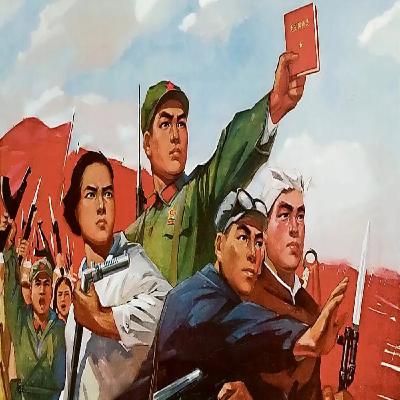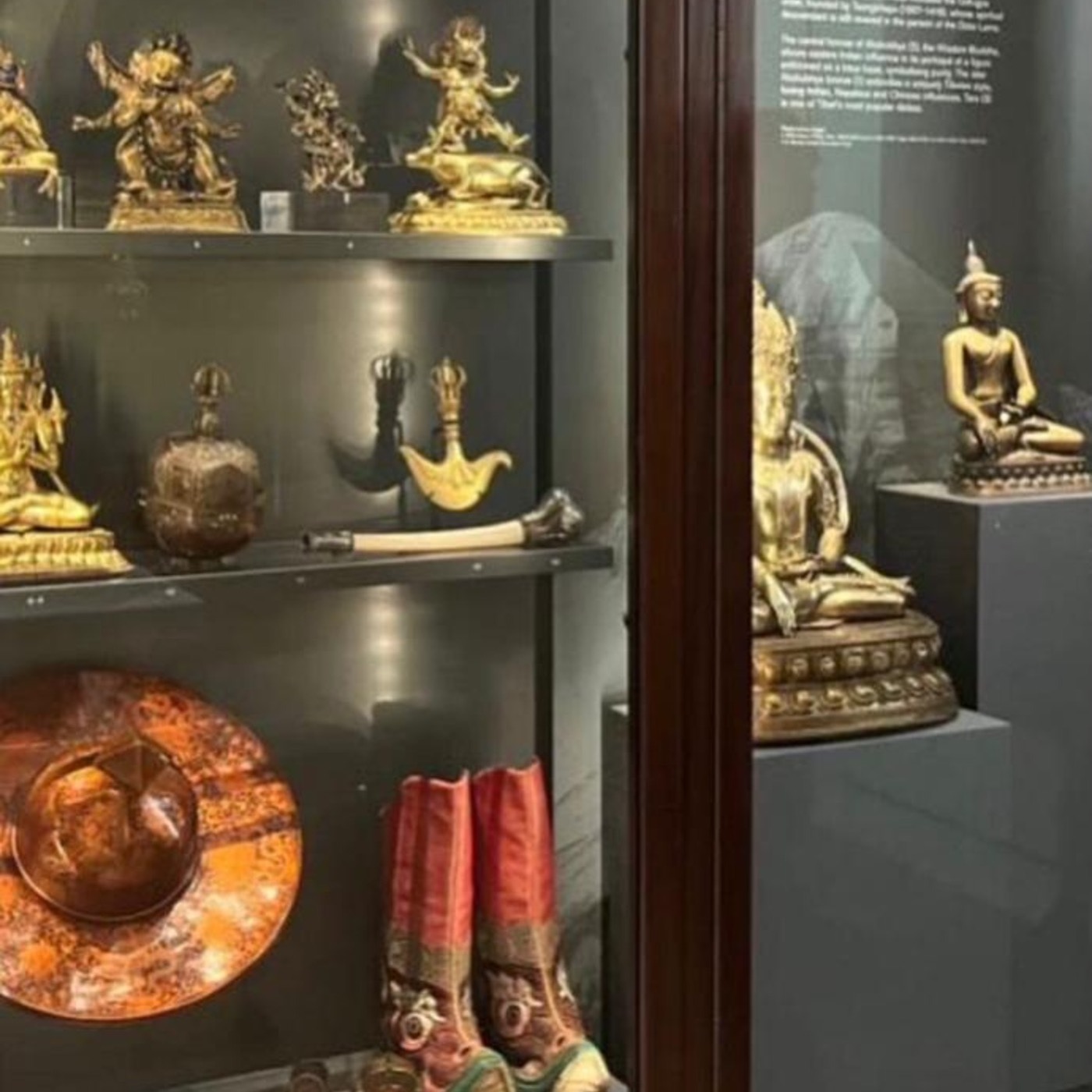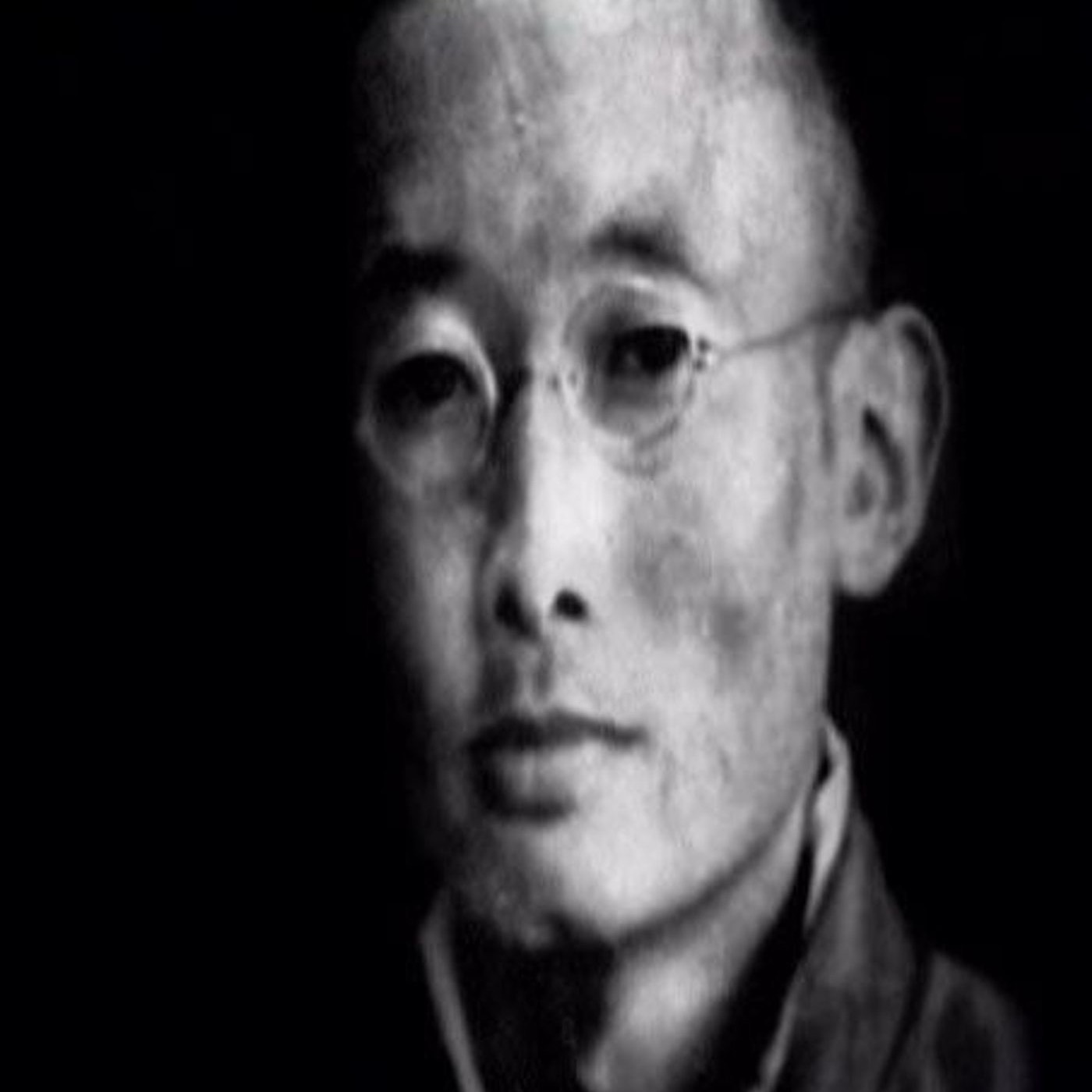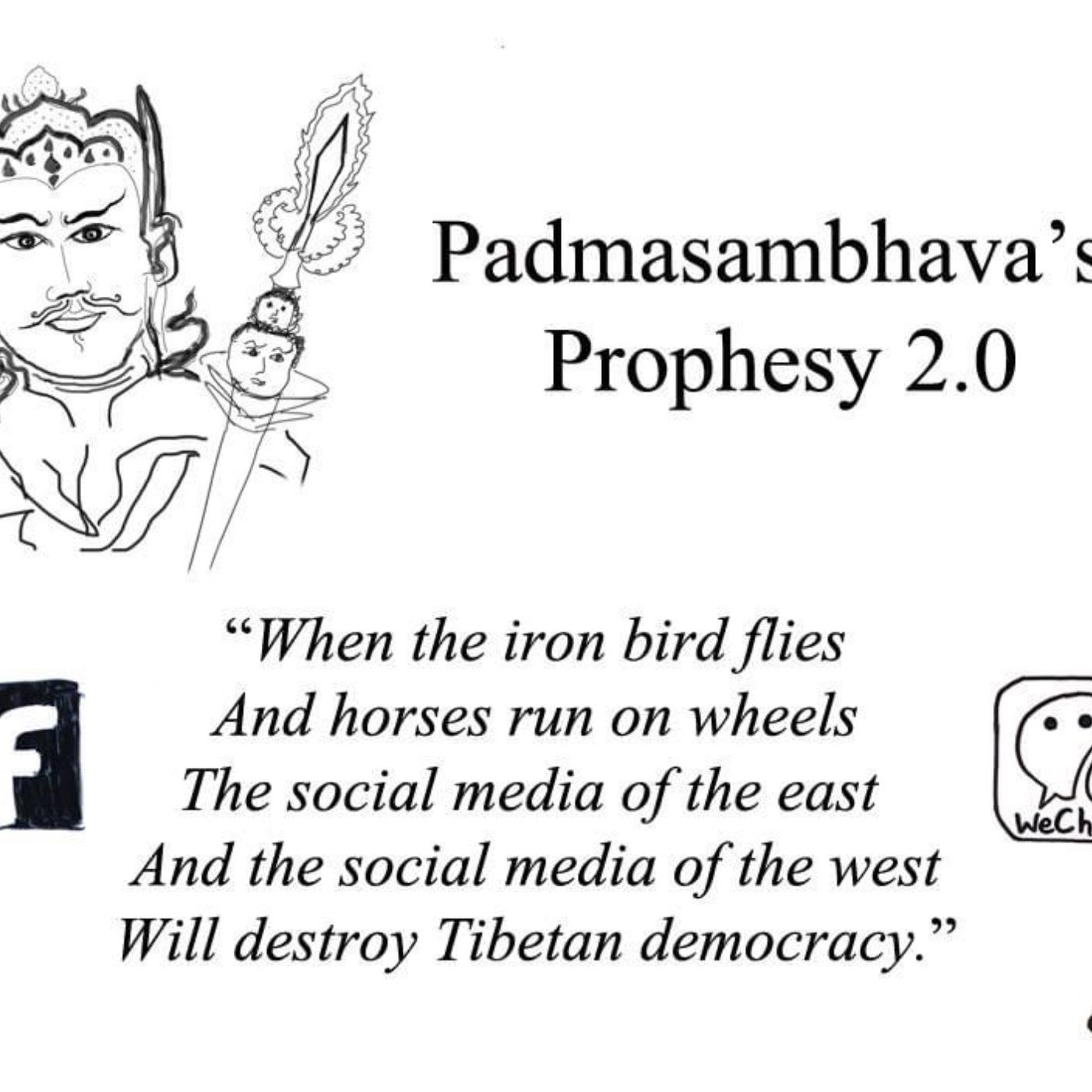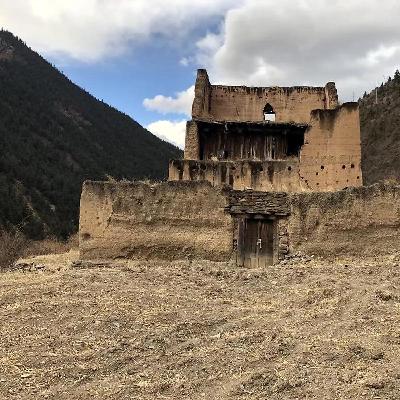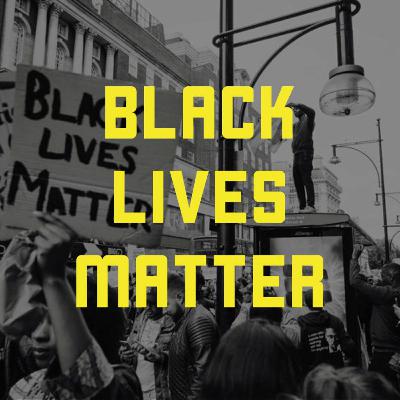Discover Khyeltam འཁྱལ་གཏམ།
Khyeltam འཁྱལ་གཏམ།

45 Episodes
Reverse
Discussion on the Epic of Gesar with Khenpo Ju Tenkyong. (Image: Himalayan Art Resources Inc.)Support this podcast at — https://redcircle.com/khyyl-gtm-khyeltam/donations
A short series on the history of 20th-century China.Intro/Outro theme: Karachal - Alash Ensemble (freemusicarchive.org/music/Alash_Ensemble/)Image: Anonymous. The Qianlong Emperor as an Emanation of the Bodhisattva Manjusri. Thangka, ink, and colors on silk. Palace Museum, Beijing. Presented entirely in keeping with Tibetan Buddhist iconography, this religious painting and others like it reinforced Qianlong's claim to rule as a righteous "wheel-turning king," or chakravartin. © Palace Museum, Beijing.Support this podcast at — https://redcircle.com/khyyl-gtm-khyeltam/donations
A short series on the history of 20th-century China.Intro/Outro theme: Karachal - Alash Ensemble (freemusicarchive.org/music/Alash_Ensemble/)Image: A Propaganda poster for the Chinese People’s Liberation Army, with Red Army and Red Guard members charging forward holding Mao Zedong’s Little Red Book. Photograph: GraphicaArtis/Getty ImagesSupport this podcast at — https://redcircle.com/khyyl-gtm-khyeltam/donations
An episode on the final chapter of Marx's Capital Vol. 1 where he delves into the origins of capitalist mode of production, giving an alternate picture of the theory of so-called primitive accumulation. (Image: Cover, Capital - Wordsworth Editions)Support this podcast at — https://redcircle.com/khyyl-gtm-khyeltam/donations
For this episode we decided to meet and discuss (like Dream and Hob Gadling in The Sandman) at least two new things we had done/learned/found worth thinking about since our last episode. These include questions about language and culture inspired by a trip to Ladakh, digging through the libraries and archives of former imperial powers like England and other European countries for Tibet-related materials (where would Tibet be on the late Queen’s Christmas culture property repatriation gift list?), Iranian filmmaker Kiarostami’s Koker trilogy and the idea of self-reflexivity in cinema and Tibetan politics. Particularly in Tibetan politics, let us reiterate. Overall, a real khichdi of an episode. All under an hour, we’re mighty please to add.Intro/Outro theme: Karachal - Alash Ensemble (freemusicarchive.org/music/Alash_Ensemble/)image: personal Support this podcast at — https://redcircle.com/khyyl-gtm-khyeltam/donations
In this episode of Khyeltam, we discuss the life of Gendun Chopel (1903-1951), perhaps, one of the foremost modern Tibetan thinkers.Intro/Outro theme: Karachal - Alash Ensemble (freemusicarchive.org/music/Alash_Ensemble/)Image credit: unknownSupport this podcast at — https://redcircle.com/khyyl-gtm-khyeltam/donations
A 'short' episode on the unexpected cultural and historical sights and sounds I encountered on the Annapurna circuit trail in Nepal. Support this podcast at — https://redcircle.com/khyyl-gtm-khyeltam/donations
In this experimental free-style episode of Khyeltam, I sat down with Palden Sonam to discuss our thoughts on democracy. As will be apparent from the discussion, we began our conversation with no clear sense of how this episode will unfold or if we will decide to upload it. However, given our long, silence our last Khyeltam episode, I have decided to upload this here anyway.Intro/Outro theme: Karachal - Alash Ensemble (freemusicarchive.org/music/Alash_Ensemble/)Image: TendorSupport this podcast at — https://redcircle.com/khyyl-gtm-khyeltam/donations
What is history? How do we know what happened in the past? Can we know the truth of our past? In this episode, Jamyang and I discuss these questions based primarily on E.H Carr's classic work "What is history?" In order to make better sense of Carr's work, we have attempted to use some of the examples from the Tibetan context. The question of what is history is inextricably linked with larger question of can we know the truth? Therefore, perhaps, given you have many hours to waste, one can listen to this episode of Khyeltam along with our second episode (from season 1) on "Roshomon." Intro/Outro theme: Karachal - Alash Ensemble (freemusicarchive.org/music/Alash_Ensemble/)Image: E.H. Carr Source: https://www.newstatesman.com/culture/2019/05/history-according-to-eh-carrSupport this podcast at — https://redcircle.com/khyyl-gtm-khyeltam/donations
This episode is on Conspiracy Theory. It may or may not have been sponsored by the CIA. Support this podcast at — https://redcircle.com/khyyl-gtm-khyeltam/donations
ཨ་རོགས་ཚོ་བདེ་མོ། མ་མཇལ་ཡུན་རིང་། ལོ་ཕྱེད་ཙམ་ངེད་གཉིས་སོ་སོའི་ལས་གལ་ཆེ་ཆུང་སྣ་ཚོགས་ལ་བྲེལ་རྐྱེན་ལེ་ཚན་གསར་པ་བཅུག་མ་ཐུབ། ད་ལན་གྱི་བརྙན་ཡོད་ལེ་ཚན་འདི་ནི་འཁྱལ་གཏམ་དུས་ཚན་ནམ season གཉིས་པའི་འགོ་འཛུགས་ཀྱི་རྟེན་འབྲེལ་དུ་ཁྱེད་རྣམ་པའི་སྤྱན་ལམ་དུ་འབུལ། འདིའི་ནང་ད་བར་གྱི་ལེ་ཚན་དང་དེ་ལ་མཆན་དང་བསམ་ཚུལ་གང་བྱུང་བ་ལ་བསྐྱར་ཞིབ་དང་མ་འོངས་པའི་ལེ་ཚན་གང་བཟོ་འཆར་ཡོད་པ་སོགས་ཀྱི་སྐོར་ལ་གླེང་ཡོད།So, we decided our hiatus has stretched long enough (and just long enough to justify calling this resumption the season two of our podcast 😂). We promise you nothing but more of the same old, same old. In this one, we talk a bit about what we have been up to so far, (besides trying to book a slot on the Cowin app), a bit of an overview of season one, and a look ahead to some future episodes. It is in video primarily for the purposes of what we Tibetans call 'temdrel'.Support this podcast at — https://redcircle.com/khyyl-gtm-khyeltam/donations
The modern Chinese empire (PRC) hides its colonial set-up by camouflaging itself as a multi-minzu (nationality/ethnic) nation-state. Central to this discourse is the idea of minzu. However, historically, this is a new concept. What is the origin of the term Minzu? How did the contemporary 56 minzu in China come into being? I discuss these questions and more in this khyeltam short episode on Thomas Mullaney’s book “Coming to terms with the Nation.”Intro/Outro theme: Karachal - Alash Ensemble (freemusicarchive.org/music/Alash_Ensemble/)Image: University of California PressSupport this podcast at — https://redcircle.com/khyyl-gtm-khyeltam/donations
What is public sphere? A dominant liberal answer: a sphere where private individuals, members of a political community, on equal footing engage in reasoned deliberation on matters of public concern to form public opinions on what is public good(s). Such a sphere is fundamental to democracy—a sphere that mediates a relationship between society and state and holds later accountable to the former. What are the problems with this dominant liberal conception of public sphere? Fundamental to democracy is public deliberation but on what and whose terms and conditions are these deliberation taking place? In an actually existing society with unequal distribution of power, who gets heard? Who represents the public? How do subordinate groups reorganize and deliberate their public concerns? We read Jurgen Habermas’s classic work on the public sphere alongside Nancy Fraser’s critical rethinking to discuss these questions and more. Intro/Outro theme: Karachal - Alash Ensemble (freemusicarchive.org/music/Alash_Ensemble/)Image description: Gopal Guru, Dalit social and political theorist, speaking on nationalism in Jawaharlal Nehru University outside the VC's office. Amidst the widespread crackdown on student political activism under the new BJP government in India and the national media proclaiming students in the university as anti-national, the students and professors of the university reorganize themselves outside the University's VC office to debate what is a nation? How should we understand nationalism? In the process, they proclaimed the space as Freedom Square--a site Nancy Fraser might call subaltern public sphere, a site resistance and counter-discourse.Image Credit: still image from https://www.youtube.com/watch?v=joTTDAOyPLY&feature=emb_titleSupport this podcast at — https://redcircle.com/khyyl-gtm-khyeltam/donations
In the mid-19th century, Gonpo Namgyel, a relatively unknown chief from Nyarong in Kham, rose to power and went on to conquer most of Kham and cause problems for both the Lhasa government and the Qing court. He has been usually depicted as a villain or a bandit in the Tibetan written and oral sources, sometimes called ten-dra (enemy of the faith) but later inducted into the pantheon of Buddhist protectors, and as 'a leader of serf uprising' by Chinese Marxist historians. Yudru Tsomu's book, the subject of this podcast, tries to resolve these contradictory narratives by locating him properly in the context of local history and cultural milieu. At the same time, it provides a useful understanding of the power arrangement that existed between the various polities in Kham and their two neighbouring power centers in Lhasa and Beijing.Intro/Outro theme: Karachal - Alash Ensemble (freemusicarchive.org/music/Alash_Ensemble/)Image: Ruins of Gonpo Namgyal's Caste in NyarongSource: http://m.zangdiyg.com/article/detail/id/14863.htmlSupport this podcast at — https://redcircle.com/khyyl-gtm-khyeltam/donations
30. Hum Dekhenge - Faiz ང་ཚོས་བལྟ་ཆོག།༷ ཕེཛ། by Jamyang and Ugyan
Support this podcast at — https://redcircle.com/khyyl-gtm-khyeltam/donations
Is it okay to punch fascists? To deny them a platform to speak? Many liberals and free speech absolutist, I think, would categorically say ‘NO.’ Directly or otherwise, I think, our attitude towards ‘freedom of speech’ and more are shaped by a liberal ideology that takes, often by abstracting from the concrete setting of the relations of power, all political opinions as equally valid or at least “right in their own way” (whatever that means). On freedom of speech, our conventional liberal wisdom suggests that no matter how much we may disagree with someone, we must defend their 'right to speak' at all costs (remember the quote attributed to Voltaire?).
If only we don’t live in the society/world where power is disproportionately distributed, and where despite everyone speaking and acting, some speeches and some actions, because of their agents' position in the 'order of things,' have more truth effect.
As far as Antifa is concerned, we can (and should) not only deny platforms to Fascists, but can/should also punch, bite, and, if we like, make mean memes about them.
Okay, but why? To know more, tune into this long “khyeltam short” episode on ANTIFA :)
Intro/Outro theme: Karachal - Alash Ensemble (freemusicarchive.org/music/Alash_Ensemble/)
Image: Button Emporium
Support this podcast at — https://redcircle.com/khyyl-gtm-khyeltam/donations
Following up on our recent/ongoing heated community debate on the #BlackLivesMatter protest in the aftermath of police murdering of George Floyd (and more since then), we decided to look briefly into the history of racism in the United States, Civil Rights Movement, the emergence of mass incarceration, and most importantly the changing (not evolving) nature of racism in the post-civil right US.
Ofcourse, we couldn't have ignored some of the questions that emerged from the recent/ongoing discussions such as appropriateness of the modes of protest (looting/ violence), Obama & "post-racist" US society, and the never-ending, possibly dead-end question of who owns and can certify/distribute the label “Tibetan"
Intro/Outro theme: Karachal - Alash Ensemble (freemusicarchive.org/music/Alash_Ensemble/)
Image: https://blacklivesmatter.com/
Support this podcast at — https://redcircle.com/khyyl-gtm-khyeltam/donations
Tibet's cultural engagement with India stretches back to the ancient past. If it was not for them, we'd be unlettered, uncouth barbarians terrorizing the plains of Central Asia (though Chogyal Namkha'i Norbu would vehemently dispute this extravagant claim.) This trans-Himalayan tryst lasts to this day but instead of Buddhism, we now have Bollywood without which Tibetan weddings would be even duller affairs. So I sat down with our somewhat regular guest Thinley Wangchuk to talk about the history of Hindi cinema (maybe as a way of overcoming our shared trauma about the death of 90s action-flicks, invariably starring Suniel Shetty, brought upon by karva-chauth films of Karan Johar.
Image: www.tallengestore.com
Track: 'Karachal' - Alash Ensemble
Support this podcast at — https://redcircle.com/khyyl-gtm-khyeltam/donations
Turning our Instagram live discussion on the infamous and often misunderstood "Seventeen point agreement"* into another khyeltam episode. This history, as Tibet historian Tsering Shakya points out, is often marred in polemics and the reality, needless to say, is in some sense, more complex.
*The Agreement between the Central People’s Government and the Local Government of Tibet on Measures for the Peaceful Liberation of Tibet
Intro/Outro theme: Karachal - Alash Ensemble (freemusicarchive.org/music/Alash_Ensemble/)
Image: Photo adapted from Claude Arpi’s exhibition
Support this podcast at — https://redcircle.com/khyyl-gtm-khyeltam/donations
A rather whimsical episode in which I begin with the origin of birds, a bit of palaeontology and taxonomy, then birds in the Tibetan oral tradition, and finally end with a pseudo-apologia for birding.
Intro/Outro theme: Karachal - Alash Ensemble (freemusicarchive.org/music/Alash_Ensemble/)
Support this podcast at — https://redcircle.com/khyyl-gtm-khyeltam/donations




